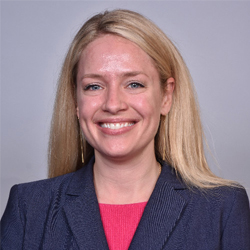Clinical research professionals in search of work will need to be more flexible than ever, even as leaders at sponsors, contract research organizations (CROs), and sites will want to think carefully about the potential benefits of new partnerships with external organizations as they all seek to achieve equilibrium in the clinical trials landscape post COVID-19, staffing experts said during an ACRP techXpo session Thursday (June 4).
As they addressed the topic of “The Future of Clinical Research Work Post COVID-19: How to Adapt Your Workforce in a Changing Environment,” global staffing firm Aerotek’s Kassandra Kaan, strategic account executive for life sciences, and Taylor Crook, director of strategic sales for life sciences, stressed that having access to talent on demand will be critical for companies that reduced headcount during the pandemic, put new hiring on hold, or have entirely new hiring needs.
Noting how the pandemic’s onset has led to plummeting clinical trial enrollments, suspensions of studies, reallocations of resources to COVID-19 trials, restrictions on travel, and delays or cancellations of many elective surgeries and other healthcare services, Kaan said the silver lining of the situation is the practically overnight creation of a virtual workforce for clinical research. “Remote monitoring existed before, but [the pandemic conditions have] really brought it to the” forefront of people’s attention, she said as an example of recent and rapid workforce changes impacting the trials landscape. “It’s going to change the market and it’s going to have an impact on the talent.”
In the current climate for studies, professionals with skillsets such as those common among clinical research associates “are being laid off, which is virtually unheard of,” Kaan added. “[But now], trial teams are being built virtually with new roles.” Besides which, Kaan said, the amount of great talent becoming available could impact the ability of many clinical research professionals to land a new job as the enterprise slowly gets back on its feet.
Meanwhile, with sponsors, CROs, and sites focusing on how and when to get back to normal, a new emphasis on disaster preparedness is a big concern for facing up to future challenges, Crook said. “Not only will this help patients feel more comfortable getting back to the sites, but it will help sites” grow bigger than before and fuel more support for research, he noted. “I’m working off the assumption that research will come back—and may come back stronger.”
However, as stay at home orders are lifted, new studies could launch and ongoing studies could resume at roughly the same time, with the potential to overwhelm the research enterprise, Crook warned. “To regain the momentum, organizations need to implement new strategies quickly, including those for staffing,” he said.
If staff losses and hiring freezes appear to be crippling a site’s ability to rebound, they may need to “right-size” their operations, Crook noted. The key may be to “get smaller, to get bigger, to get better,” he said. Restructuring may involve creating partnerships to foster a contingent or project-based workforce, or to take advantage of the flexibilities that outsourcing, offshoring, and consulting arrangements can offer.
For job seekers themselves to succeed in this new environment, they need to be adaptable to constant change and foster a growth mindset, as well as to be flexible in terms of job requirements, types of work they are willing to do, and multitasking, Crook said. “Being flexible could help you stand out in a crowd—are you willing to travel, relocate, keep working at home, work part- or full-time, or invest in [your own] training?” he asked.
Crook also said potential employees’ focus on the bottom-line impacts they’ve had in previous positions as they deal with their would-be next employers can put them in the position of “speaking the language” that business leaders value most.
“In this gap area of uncertainty, there’s still plenty of work that needs to be completed,” Crook added. “We believe we are really close to seeing things turn around for the industry…and [that] things will look better by the close of 2020.”
ACRP’s techXpo sessions are free and do not offer contact hours.
Author: Gary Cramer



